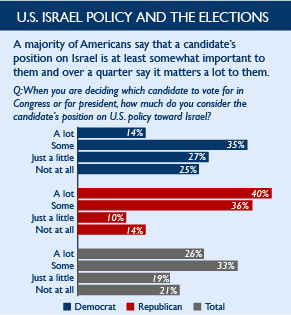Originally published at MintPress News.
WASHINGTON — Poll results released last month show that Americans are sharply divided over the influence of Israel on U.S. politics, and those divisions often fall along party lines.
On Dec. 4, The Brookings Institution, a highly influential Washington-based think tank, released the results ofa study of American attitudes toward Israel and the Middle East. The report comes after a year in which Israel’s influence on America’s governance and foreign policy received heightened scrutiny, especially following a controversial speech to a joint session of Congress by Israeli President Benjamin Netanyahu on March 3. AIPAC, the powerful Israeli lobbying group, also faced increased criticism.

The bulk of the poll was based on the opinions of 875 randomly selected Americans, but the study’s author, Shibley Telhami, a nonresident senior fellow at Brookings’ Project on U.S. Relations with the Islamic World, also polled an additional 863 additional Americans who self-identify as Evangelical or Born-again Christians to determine how their attitudes differed from the average.
When asked “How Much Influence Does the Israeli Government Have in American Politics?” 37 percent, or just over 1 in 3 Americans, feel Israel has too much influence. Eighteen percent say Israel should have even more influence over our government, while the largest group, at 44 percent, feels Israel wields an appropriate level of influence.
Almost half of Democrats, 49 percent, feel Israel has too much influence over U.S. politics, while a slight majority of Republicans, 52 percent, are comfortable with Israel’s current level of influence. Among Evangelical Christians, meanwhile, 39 percent believe Israel has too little influence and 38 percent are satisfied with the country’s level of influence.
Telhami also asked respondents about their views on the conflict between apartheid Israel and occupied Palestine. Twenty-nine percent of Americans reported that they are “very concerned” about recent events in Israel and Palestine, while 38 percent are “somewhat concerned.” When asked who is to blame for strife in the region, the most popular answer, 31 percent, was the lack of a peace process, “while 26% equally blame continued Israeli occupation and settlement, expansion in the West Bank, and Palestinian extremists.” These results also showed strong partisan differences:
[A] plurality of Democrats, 37%, blame continued Israeli occupation and settlement expansion, followed by 35% who blame the absence of serious peace diplomacy, while 15% blame Palestinian extremists. In contrast, 40% of Republicans blame Palestinian extremists first, followed by 27% who blame absence of serious diplomacy, and 16% blame continued Israeli occupation and settlement expansion.
The report noted a slight increase in support for a one-state solution to problems in Israel compared to findings in 2014. Under a one-state solution, Israel and Palestine would become a single, multicultural, multireligious nation, as opposed to two-state solutions which would divide Israel and Palestine into two separate, independent countries.
“Those who advocate a one-state solution, 31%, are now comparable to those who advocate a two-state solution, 35%,” Telhami wrote, adding that Republicans saw the largest increase in support for a single-state solution. “The most notable change is that Republicans this year equally support a two-state solution vs. one-state solution (29% each).”
More people are also willing to accept a single-state solution if a two-state solution proves impossible, he added:
Among those who advocate a two-state solution as their preferred solution, 73% say they would support a one-state solution if the first option were no longer possible (in comparison to only 66% in 2014).
The poll also found that Netanyahu’s popularity has fallen sharply over the last year, at least among Democrats. Thirty-four percent now view him unfavorably, up from 22 percent in 2014, while Republicans’ opinions of him remain largely unchanged.
